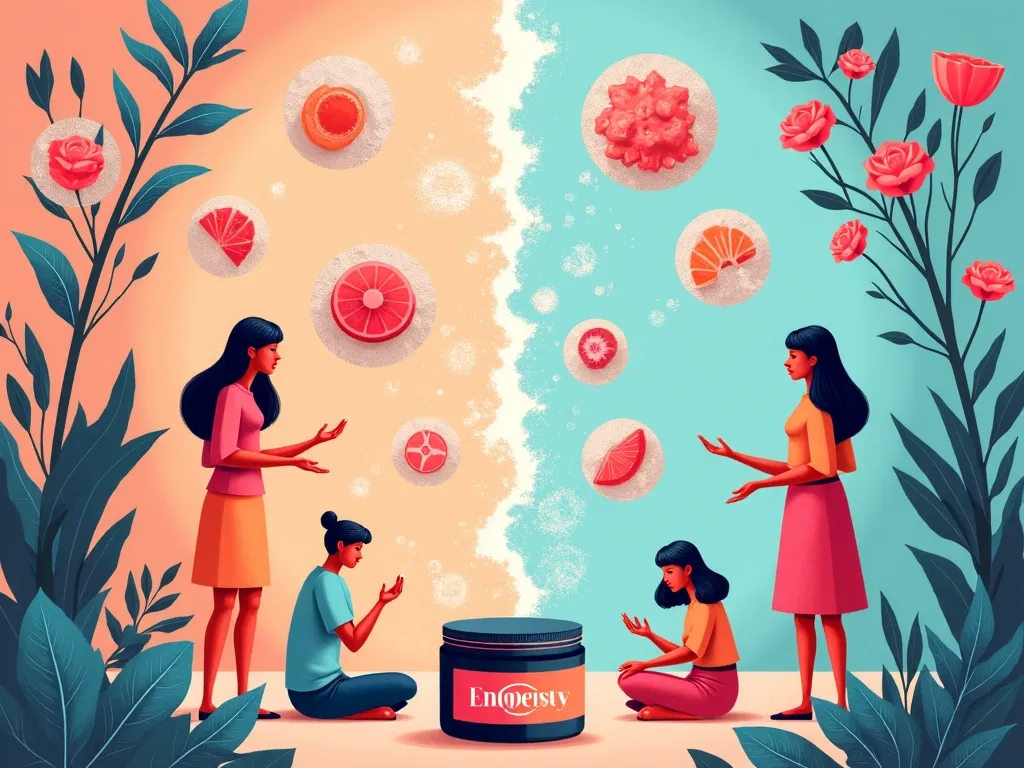In today's world, bombarded with velvet promises and loud advertisements of beauty products, it is easy to get lost in the jungle of contradictory information. Every day we hear about "miracle" ingredients that are supposed to rejuvenate our skin by a decade, or "revolutionary" skincare techniques that sound like sweet melody to our ears. Often, however, these loud assurances leave behind only a bitter aftertaste of disappointment and a slightly empty wallet.
That's why we decided to tackle the most persistent beauty myths that have clung to consumers like a sticky cream. In this article, we'll gently blow away the misinformation fog and reveal the cold truth behind the five most popular beliefs about beauty and skincare. You'll learn facts supported by scientific evidence that will allow you to make informed purchasing decisions and create an effective skincare routine based not on marketing whispers, but on hard, tangible facts.
The Most Popular Myths in Skin Care
Skincare is rife with myths that often mislead consumers. One of the most popular is the belief that expensive products always work better than their cheaper counterparts. The truth is that price rarely correlates with effectiveness. – the composition and proper matching to the needs of the skin determine the effectiveness of the cosmetic. Many dermatologists confirm that some inexpensive products available in drugstores can provide the same effects as luxury brands.
In addition, many people believe that natural ingredients are always safer and better for the skin. However, this generalization does not take into account that some natural substances can be highly allergenic or irritating (such as essential oils or some plant extracts), while carefully developed synthetic ingredients often undergo rigorous safety testing. In reality, effective skin care is based on a balanced approach and understanding the individual needs of the skin, not blindly following trends.
As a result, the myth that skin needs to be cleansed to the point of “tightness” still persists among consumers. This approach can seriously disrupt the natural protective barrier of the epidermis., leading to excessive dryness and, paradoxically, increased sebum production. Instead of striving for a feeling of tightness, we should gently cleanse the skin to maintain its natural pH and microbiome.
What’s more, a common myth is that people with oily skin don’t need moisturizer. This fundamental misconception often leads to worsening skin conditions. Oily skin also requires proper hydration, as excess sebum production can be a defense mechanism against dehydration. By choosing lightweight, oil-free formulas, people with oily skin can effectively moisturize without clogging pores. Properly moisturized skin better regulates sebum production and maintains balance, which helps reduce shine and improves overall appearance.
7 Myths About Hair Care
Hair care has become rife with myths that have been repeated and accepted for years. Often we are wasting time and money for treatments that do not bring the expected results. It is worth taking a closer look at the most popular myths that can sabotage our efforts to achieve healthy and beautiful hair.
One of the most common myths is that frequent trimming of the ends speeds up hair growth. In reality, hair grows from the roots, not the ends, so regular trimming only affects their condition, not the rate of growth. Another myth concerns washing hair - contrary to popular belief, daily washing does not have to be harmful if we use the right products adapted to our hair type.
Shampoos, conditioners and masks advertised as “revitalizing” damaged hair cannot repair structural damage. Cosmetics can only improve the appearance of hair by masking problems., but they do not repair permanent damage. Let's also remember that expensive products do not always mean higher quality - we often pay for the brand, packaging and marketing, not the composition.
Hair needs, above all, consistency, patience and the right approach, not miraculous and expensive products.
Natural oils, masks and home remedies often outperform expensive products, providing hair with essential nutrients. Many people brush, comb and expose their hair to excessive heat, which leads to weakening of its structure. Gentle care, proper diet and hydration of the body are the basis of healthy hair, which we often forget about when looking for quick solutions.
The Truth About Beauty Supplements
The cosmetic supplement market is growing at an astonishing pace, and manufacturers promise us miracles: shiny hair, strong nails and radiant skin after taking magic pills. Meanwhile, the reality is different. Scientific studies often do not confirm the effectiveness of many advertised ingredients, and consumers spend a fortune on products that they don't work as effectively as the ads suggest.
Collagen, advertised as the elixir of youth, is not absorbed into the body in its entirety. Instead of investing in expensive collagen supplements, it is worth enriching your diet with products that stimulate the body's natural collagen production. Vitamin C, zinc, and protein support this process more effectively than most supplements available on the market.
Biotin (vitamin B7) is often recommended by beauticians as a solution for weak hair and nails. The truth is, however, that supplementation only helps people who suffer from a real deficiency. Most of us get enough biotin from our daily diet, making additional supplementation unnecessary.
No supplement can replace a balanced diet, regular physical activity and adequate sleep. – this is a fundamental principle that we forget about when looking for quick solutions in tablets. Instead of buying another advertised product, it is better to invest in a consultation with a dietician who will help identify real deficiencies and propose a natural way to supplement them.
Many supplements contain ingredients in doses too low to have any effect, or in forms that are poorly absorbed by the body. Let's read the labels and check the composition of the products, paying attention to the chemical forms of elements and vitamins - they differ in bioavailability and effectiveness.
Social pressure and clever marketing lead us to believe that we need more and more products to achieve unrealistic standards of beauty. In fact, a holistic approach to health brings better and longer-lasting results. Before reaching for another supplement, consider whether it actually solves the problem or whether it only soothes our need for action, masking deeper health issues that require a more comprehensive approach than swallowing pills promising instant transformation.
Cosmetic Procedures – Between Science and Marketing
In the age of social media and the "before and after" culture, cosmetic procedures have become not only a subject of medical interest, but also a powerful marketing tool. Instagram and TikTok influencers show off quick transformations after procedures, often omitting the long recovery process or potential side effects. The “Paris” filter or Facetune app create unrealistic expectations about the results of procedures, misleading consumers.
According to research, over 70% of young women experience the so-called snapchat dysmorphia – a phenomenon in which application filters distort the perception of one’s own appearance. This leads to a growing interest in treatments that often do not bring the expected results. In order to consciously choose cosmetic procedures, it is worth distinguishing between science and marketing:
Key aspects of choosing cosmetic procedures:
- Clinically proven results vs. marketing promises
- Realistic expectations about how long the effects will last
- Understanding potential side effects and contraindications
- Verification of qualifications of the person performing the procedure
How to verify information about cosmetic products
In the world of molecular cosmetology, verifying the authenticity of manufacturers' claims requires the use of systematic analytical methodology. The key element is the INCI analysis (International Nomenclature of Cosmetic Ingredients), which allows for the identification of active substances, their concentrations and potential molecular interactions. Special attention should be paid to the positioning of ingredients in the list - those listed in the initial part occur in higher concentrations, determining the actual effectiveness of the preparation.
O active ingredient, how often are you portrayed in the wrong light! Your therapeutic concentration is often underestimated, and promises related to your effectiveness are overstated. Quantitative and qualitative spectrophotometric analysis of active substances is an essential tool for verifying marketing claims, especially in the case of substances such as retinoids, biomimetic peptides or growth factors.
In vitro i in vivo Clinical trials are the gold standard for verification. An expert should critically evaluate the research methodology, sample size, randomization, and skin biomarkers used. Double-blind, placebo-controlled studies offer the highest evidential value, while anecdotal consumer testimonials or influencer opinions lack scientific validation. When analyzing clinical data, one should also consider potential conflicts of interest resulting from research financing by manufacturers, which can lead to so-called publication bias – biased publication of only positive results.
Effective solutions supported by scientific research
In the world of beauty, where noise The number of marketing promises is overwhelming, it is worth basing your care on methods that have been scientifically verified. Hyaluronic Acid is one of the most researched ingredients, whose effectiveness in moisturizing the skin has been confirmed in dozens of clinical studies.
The advertisements buzzing around us often promise miracles. The facts are different.
Retinol remains the undisputed leader in the fight against signs of aging, and its effects have been documented in studies conducted for over 40 years. Scientists from the University of Michigan have shown that regular use of retinol increases collagen production by 80% in 12 weeks. Additionally, studies from the prestigious Journal of Investigative Dermatology confirm that it reduces the visibility of wrinkles and discoloration. Crash! – the myth that expensive anti-wrinkle creams are more effective than those containing scientifically proven ingredients is disintegrating so quickly.
Sun protection is the basis of effective care.
“Daily application of SPF50 reduces the risk of premature skin aging by 24% and reduces the chance of skin cancer by more than 50%,” according to a study published in the New England Journal of Medicine.
The noisy streams of marketing information often obscure the fact that the simplest solutions can be the most effective. Research conducted by Harvard Medical School has shown that proper hydration improves skin elasticity by 30%. Hydrating the skin from the inside, by drinking about 2 liters of water a day, and using products with ceramides and glycerin, gives effects comparable to cosmetic treatments. Hair, hair – this is the sound of the best and cheapest ally of your beauty.
The Truth About Beauty: Separating Fact from Fiction
The world of cosmetics and skincare is a space where myths and marketing promises often obscure reality. As we have seen in this article, many commonly accepted “truths” about beauty are in fact myths that deserve critical evaluation.
Key points to remember:
- Expensive cosmetics do not always mean better quality - composition and scientific research are more important than price and brand
- Natural ingredients are not automatically safer or more effective than synthetic ones.
- An individual approach to care brings better results than blindly following trends.
- Consistency in a skincare routine often outweighs the effectiveness of individual “miracle” products
A conscious consumer both reads labels, verifies ingredients, and follows scientific evidence. We encourage critical thinking when choosing cosmetics and verifying information from reliable sources.
In the future, beauty trends will likely evolve towards greater transparency, personalization, and scientifically proven solutions. We can expect technology and science to enter the beauty world even more, potentially offering more personalized solutions. At the same time, consumers may become even more demanding and aware, which will likely force manufacturers to be more honest in their marketing communications.
Start conscious care today! Verify the ingredients of your favorite cosmetics, look for evidence-based reviews and don't be fooled by empty promises. Your skin will thank you for it with an approach based on facts, not myths.
Frequently asked questions
Are more expensive cosmetics always better than cheaper counterparts?
Absolutely not. Price often reflects marketing, packaging, and branding costs, not the actual effectiveness of the ingredients. Some cheaper products contain the same active ingredients as their more expensive counterparts…
How can you tell if a cosmetic manufacturer’s promises are exaggerated?
It is worth paying attention to overly spectacular promises, such as "10 years younger" or "effect as after the procedure". Always check the INCI composition and look for clinical studies confirming the effect. If the manufacturer uses the terms "miraculous" or "revolutionary" without concrete evidence...
Are natural cosmetics safer for the skin than those from the laboratory?
This is one of the most popular myths. Natural ingredients can also cause allergic reactions, and some synthetic substances are very well tested and safe. The key is the individual skin reaction, not the origin of the ingredients…
How long should you use the product to evaluate its effectiveness?
Most products require regular use for at least 4-6 weeks to see real results. This is due to the skin’s natural cell renewal cycle. Promises of immediate results are usually exaggerated, except for moisturizing or brightening products…
Can anti-wrinkle cosmetics completely eliminate wrinkles?
Unfortunately, no cosmetic can completely eliminate existing wrinkles. Anti-aging products can improve hydration, skin texture, and reduce the appearance of fine lines, but deep wrinkles require more invasive treatments. Marketing often promises more than…
Are chemical peels harmful to the skin?
Contrary to fears, properly selected AHA, BHA or PHA acids can significantly improve the condition of the skin without damaging it. The key is to choose the right concentration and type of acid for your skin type. It is a mistake to believe that every chemical peel must cause severe flaking or…







